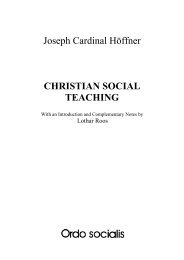Prof. Franz Josef Stegmann Bethlehem Social ... - Ordo Socialis
Prof. Franz Josef Stegmann Bethlehem Social ... - Ordo Socialis
Prof. Franz Josef Stegmann Bethlehem Social ... - Ordo Socialis
You also want an ePaper? Increase the reach of your titles
YUMPU automatically turns print PDFs into web optimized ePapers that Google loves.
<strong>Stegmann</strong><br />
competition was a natural plant" growing be itself: according to our "conviction, it is a<br />
cultivated plant 106 that must be tended, pruned and nursed.<br />
3.8 Framework and individual moral commitment<br />
"The framework is the main place where morality in the market economy is to be situated". 107<br />
This insight does not make individual moral commitment unnecessary and superfluous, as the<br />
framework is sometimes accused of doing. On the contrary, individual economic participants<br />
have to observe the rules of the framework that have been enacted to regulate their economic<br />
activities - their "moves in the economic as well as to regulate the economy as a whole. and<br />
must in no way avoid or trick them. This may often demand great moral strength.<br />
On the other hand, being citizens, both employees and employers have the political and<br />
ethical responsibility to be involved in and to contribute to shaping this framework as well us<br />
to contribute their political and moral convictions - for instance, by the election of members to<br />
parliament. Democracy "means that the people themselves must take charge of ethics"; and in<br />
a democratic society the majority decides on the content of the framework and determines its<br />
details. Therefore, “as many as possible" should make their “consciences heard" and their<br />
"voting power felt on matters of basic principle". 108 Finally, in spite of competition, within the<br />
framework the individual market participants can make additional efforts for social,<br />
ecological or - in general terms - moral purposes. As long as fellow competitors do not exploit<br />
such efforts, which are connected with expenses and costs, but perhaps take them on and<br />
continue them, higher moral standards will emerge.<br />
If we consider human nature realistically, we recognise that moral appeals to the conscience<br />
of single individuals, expect too much from these individuals and overtax them whenever they<br />
are economically punished for their moral behaviour - by higher expenses or renunciation of<br />
economic advantages. The great importance of the framework must therefore not he<br />
overlooked. Moral appeals work best in one-to-one relationships, as in a family or circle of<br />
friends. The thesis of the framework as the main place of morality in market economy<br />
emphasises that "the conscience of the individual person is not able to compensate for the<br />
failings of the institution". 109 In the 19th century, Christian <strong>Social</strong> Teaching and the (German)<br />
Catholic <strong>Social</strong> Movement oriented themselves - maybe unconsciously - to this fact when<br />
they demanded both a "reform of the way of thinking" as well as a "reform of conditions”, to<br />
solve the social questions of their time. 110<br />
CONCLUSION<br />
Market and morality, competition and social justice seem to exclude each other because economic<br />
efforts for moral, social or whatever purposes are connected with expenses and can be<br />
exploited by fellow competitors who do not have to bear those additional costs. Can this<br />
106<br />
Quoted according to Oswald von Neil‐Breuning, Trennendes und Gemeinsames in den Hauptrichtungen der<br />
Wirtschaftswissenschaft und Wirtschaftspolitik, in: Grundfragen der Wirtschaftsordnung, Berlin 1954, 215‐231.<br />
218.<br />
107<br />
See note 2.<br />
108<br />
Martin Prozesky, Morality of the people, by the people and for the people, in: Sunday Times, 11 July 1999.<br />
109<br />
Hermann Krings. Norm und Praxis. Zum Problem der Vermittlung moralischer Gebote, in: Herder‐<br />
Korrespondenz 45 (1991) 228‐233. 230.<br />
110<br />
See <strong>Franz</strong> <strong>Josef</strong> <strong>Stegmann</strong>, Sozialer Katholizismus und kirchliches Lehramt: Von der Sozialreform zur<br />
Gesellschaftspolitik. in: Theologia et Jus Canonicum. ed. by Heinrich J.F. Reinhardt, Essen 1996, 581‐598.<br />
44















